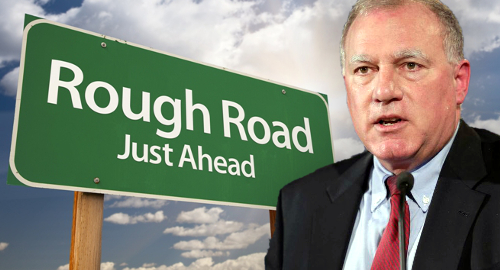 Connecticut’s Attorney General says there are “not insubstantial” legal risks to allowing the state’s two gaming tribes to build a third casino off their tribal lands.
Connecticut’s Attorney General says there are “not insubstantial” legal risks to allowing the state’s two gaming tribes to build a third casino off their tribal lands.
Last week, Connecticut Gov. Dannel Malloy asked his AG George Jepsen (pictured) to provide an analysis of whether the third casino joint venture proposed for the East Windsor region would survive a legal challenge by rival casino operator MGM Resorts as well as a possible review by the federal Bureau of Indian Affairs (BIA).
MGM has challenged the legality of the state legislature awarding the MMCT joint venture of the Mashantucket Pequot and Mohegan tribes an additional casino license without inviting other operators to bid on the project. The tribes say the East Windsor casino is necessary to fend off competition from MGM Springfield, which is set to open next year just across the Massachusetts border.
The Connecticut legislature is currently mulling a bill that would formally authorize the MMCT project but Jepsen’s reply to Malloy’s request says that “it is foreseeable that any legislation resulting in approval of the joint tribal entity’s operation of casino will be challenged” for violating the US Constitution’s commerce and equal protection clauses.
Jepsen’s letter states that the potential of these constitutional claims succeeding in court is “not at all substantial.” And while Jepsen says there are “potentially meritorious defenses” that his office can raise to counter these claims, “the relative novelty of the legal issues such claims would present makes it difficult to predict their outcome with confidence.”
TRIBAL COMPACTS AT RISK
Jepsen expresses concern that allowing the tribes to operate outside their tribal lands could void their tribal-state gaming compacts, alleviating the tribes of the necessity of paying the state a share of slots revenue in exchange for slots exclusivity.
Last year, the BIA sent the tribes letters indicating that its preliminary examination suggested that the off-reservation casino plan wouldn’t impact the exclusivity portion of the tribes’ gaming compacts. But Jepsen notes that federal courts, not the Interior Department, have jurisdiction over gaming compact disputes.
Furthermore, Jepsen notes that there’s a new sheriff in the White House, and President Donald J. Trump was “actively involved in pursuing casino gaming interests in Connecticut” in the 1990s. Moreover, Trump’s comments at the time regarding his Mashantucket Pequot competition prompted the National Indian Gaming Association to file a complaint regarding Trump’s “obscene, indecent and profane racial slurs.” And lest we forget, Trump has demonstrated an elephant-like memory regarding his lengthy enemies list.
Jepsen said that while the Interior Department’s past practice suggests it wouldn’t have a problem with the state amending its tribal compacts to allow an off-reservation casino without jeopardizing existing payment arrangements, the Trump factor makes the federal response “at best, difficult to judge.”
MO TRIBES, MO PROBLEMS
Jepsen also voices concern that authorizing the tribes to operate off their tribal lands could pose problems should the federal government recognize other Connecticut tribes, such as the Schaghticoke Tribal Nation, as eligible for casino operations under the Indian Gaming Regulatory Act (IGRA).
Jepsen reminded Malloy that a similar letter he wrote in 2015 warned that allowing off-reservation gambling would “significantly increase the likelihood that newly acknowledged tribes would succeed in asserting rights to casino gambling under IGRA.” Jepsen said his office sees “no reason to change our assessment of this issue.”
CONCLUSION AND REACTION
Bottom line, Jepsen said the risks in authorizing the third tribal casino, “while impossible to quantify with precision, are not insubstantial and cannot be mitigated with confidence.” Jepsen says his office isn’t in a position to opine on whether the potential economic benefits of the plan outweigh the risks, “however minimal they may be.”
MGM’s chief legal counsel Uri Clinton said Jepsen’s letter confirmed that the state was risking “hundreds of millions in annual revenue if it proceeds with a commercial casino, even if that casino is to be operated by the two federally-recognized tribes.” Clinton said the only way forward was “by establishing a competitive bidding process.”
The tribes said that while they appreciated Jepsen’s “thoughtful” response, “it does not address the actual legislation pending in the legislature right now.” Tribal spokesperson Andrew Doba noted that the Senate bill makes the authorization of the third casino “expressly contingent upon BIA approval of the tribes’ compact amendments.”
Doba also slammed MGM for “talking out of both sides of their mouth.” Doba claimed that MGM’s push for an open tender “would immediately jeopardize” the tribes’ obligation to pay the state a share of their slots revenue and thus MGM’s comments “should call their credibility into question for any policymakers.”